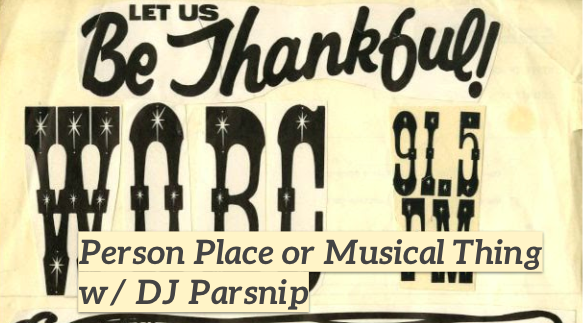
Person Place or Musical Thing with Charlotte Hill, double-degree fifth-year
Person Place or Musical Thing with DJ Parsnip, airs Saturdays 8–9 a.m. on WOBC.
What is your show about, and how did you choose your content?
The basic premise is that I pick one songwriter or pop artist each week and tie them to a “concert hall” classical composer. I play their music side by side and explore both musical connections and broader narrative connections like their personal relationships, artistic personas, or biographical circumstances.
For most of my life, I’ve had a sort of dual musical existence. My mom is a violin teacher and my family runs a chamber music camp, so I’ve been soaked in classical music since I was little. My piano teachers throughout my life have been my mentors and heroes. But at the same time, I grew up in a New York suburb with an absurdly prolific songwriting scene. I socially gravitated to the D.I.Y. artistic community early on, taking the commuter train to shows and realizing I wanted to write, too.
Since coming to Oberlin, I’ve felt like this is the place where I am a classical musician, and home is the place where I am a songwriter. On breaks, my band has frantically thrown together demos and played as many shows as possible for the few days I’m home. When I come back, I’m burnt out on writing and hole up in Robertson Hall again, delighted to return to Schumann.
In some ways, keeping the two separate has felt like a symptom of insecurity. Like, if I have an embarrassing memory slip in a classical concert, I still have this secret other life full of PBR and recording jargon. And if I can’t keep up with the recording jargon, at least I know how to play Beethoven, I guess.
This show has been an attempt to find peace in the middle of the Venn diagram. At first I worried it might land as overly indulgent. But it’s been so cool to see it resonating with my friends and family that tune in. And an added bonus is that listeners who are more familiar with one musical world get an invitation to the other when they’re placed side by side. The distinctions start to feel silly. At the end of the hour I hope listeners are just basking in it all, classical or non-classical.
Is there a particular format you follow? What is your recording process like?
Almost every week I play three pairs of tracks, with each pair capturing some sort of tie between the artists. Most weeks I’m itching to feature one artist and have to go down a lot of research dead ends to find a good match. It can take a second, but once the musical and narrative puzzle pieces fall into place, it’s really satisfying. I broadcast the shows live in the studio, so I just have to plan out my schedule for the hour in advance — if I’m not careful I could ramble about one track the whole time.
What has been a challenge you faced while broadcasting this semester? A success?
Now that I’ve been doing this for a bit, I’m running out of artists that I know like the back of my hand. So there’s much more research, and finding pairings is less intuitive. But there’s joy in that too, because I’m discovering a lot of new music. Last week was Solange and Fanny Mendelssohn, and I found Solange’s 2003 song “Naive” featuring Beyoncé and Da Brat for the first time (such a hit), and this incredible recording of the Fanny Mendelssohn Piano Trio by a group called Trio Vivente.
How long have you been doing your show? How have you noticed things change with the pandemic?
I started the show last semester. I had been inside the WOBC space once before, in my first year, and it was on my Oberlin bucket list to host a show.
The timing has felt just right. At the macro scale, classical music is having a serious reckoning about its Eurocentric roots and social backwardness, and all of the classical musicians I know are soul searching about what we want this art to be about. More personally, I’ve deeply missed my musical communities since the pandemic hit, and have had to make big decisions about my next musical chapter post-Oberlin in the middle of it all.
I didn’t anticipate it, but hosting the show became a perfect balm for both my pandemic blues and classical music confusion. I miss performing — being on air is a performance of sorts. I miss connecting over music — I get to call my mom, aunt, and best friend after every show to debrief. My friends and I are questioning our musical paths — I get to deep dive into vulnerable, heart-stopping performances every week, reminding myself why I love to make music.
Can you provide us a taste of Person Place or Musical Thing?